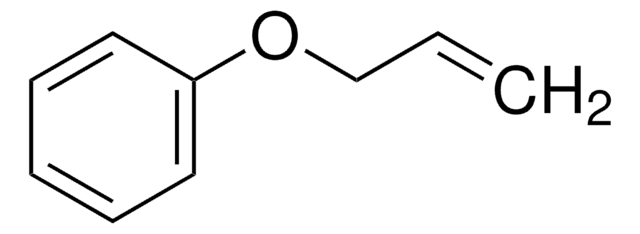All Photos(1)
About This Item
Linear Formula:
(H2C=CHCH2)2O
CAS Number:
Molecular Weight:
98.14
EC Number:
MDL number:
UNSPSC Code:
12162002
PubChem Substance ID:
NACRES:
NA.23
Recommended Products
Quality Level
Assay
98%
form
liquid
refractive index
n20/D 1.416 (lit.)
bp
94-95 °C (lit.)
density
0.803 g/mL at 25 °C (lit.)
SMILES string
C=CCOCC=C
InChI
1S/C6H10O/c1-3-5-7-6-4-2/h3-4H,1-2,5-6H2
InChI key
ATVJXMYDOSMEPO-UHFFFAOYSA-N
Signal Word
Danger
Hazard Statements
Precautionary Statements
Hazard Classifications
Acute Tox. 4 Oral - Eye Irrit. 2 - Flam. Liq. 2 - Skin Irrit. 2 - STOT SE 3
Target Organs
Respiratory system
Storage Class Code
3 - Flammable liquids
WGK
WGK 3
Flash Point(F)
19.4 °F - closed cup
Flash Point(C)
-7 °C - closed cup
Personal Protective Equipment
dust mask type N95 (US), Eyeshields, Gloves
Choose from one of the most recent versions:
Already Own This Product?
Find documentation for the products that you have recently purchased in the Document Library.
Customers Also Viewed
Daham Jeong et al.
Carbohydrate polymers, 198, 563-574 (2018-08-11)
A novel self-healing hydrogel was prepared from a cationic β-cyclodextrin oligomer allyl ether [C(βCD-OM)AE] using a triple cross-linking strategy combining electrostatic interaction, host-guest complexation, and CC bonds as the macrocrosslinker. Here, the C(βCD-OM)AE@Ad gel was successfully prepared by polymerization of
Weike Zou et al.
Science advances, 6(13), eaaz2362-eaaz2362 (2020-04-08)
Dynamic covalent polymer networks exhibit unusual adaptability while maintaining the robustness of conventional covalent networks. Typically, their network topology is statistically nonchangeable, and their material properties are therefore nonprogrammable. By introducing topological heterogeneity, we demonstrate a concept of topology isomerizable
Xuemei Wang et al.
Talanta, 166, 300-305 (2017-02-19)
Novel magnetic mesoporous molecularly imprinted polymers (MMIPs) with core-shell structure were prepared by simple surface molecular imprinting polymerization using tetrabromobisphenol-S (TBBPS) as the template. The MMIPs-TBBPS were characterized by fourier-transform infrared spectrometry (FTIR), scanning electron microscopy (SEM), transmission electron microscopy
Mohammad A Rahman et al.
Scientific reports, 9(1), 6571-6571 (2019-04-27)
Cellular CYP2E1 is well-known to mediate alcohol- (ALC) and acetaminophen- (APAP) induced toxicity in hepatic and extra-hepatic cells. Although exosomes have been gaining importance in understanding mechanism of intra- and inter-cellular communication, the functional role of drug metabolizing cytochrome P450
Mohammad A Rahman et al.
Toxicology letters, 292, 31-38 (2018-04-26)
Diallyl sulfide (DAS) has been shown to prevent xenobiotic (e.g. ethanol, acetaminophen) induced toxicity and disease (e.g. HIV-1) pathogenesis. DAS imparts its beneficial effect by inhibiting CYP2E1-mediated metabolism of xenobiotics, especially at high concentration. However, DAS also causes toxicity at
Our team of scientists has experience in all areas of research including Life Science, Material Science, Chemical Synthesis, Chromatography, Analytical and many others.
Contact Technical Service













